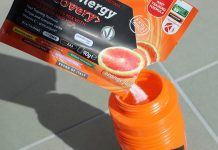Sports supplements. Don’t you use them?
If you practise sport at any level and it plays an important role in your life, sports supplements can greatly help to supplement your daily diet. Even if I already follow a naturally healthy and balanced diet? Why?
In fact, the general guidelines for an athlete’s diet are not too different from those that should apply to everyone, both sedentary and active. Rules that set out a varied, balanced diet, without exaggerating in terms of quantity and always opting for high-quality, seasonal and local foods over prepackaged foods.
And yet, due to our particularly hectic modern way of life and an increasingly unhealthy and industrial range of foods on offer, eating properly can be quite the challenge nowadays for everyone. So just imagine how hard it is for athletes, people who have a greater daily requirement of specific nutrients.
Together with an expert, we have come up with 5 pills of wisdom explaining 5 major benefits that you could get from the conscious, focused use of food supplements for sports.
- Food supplements for sports are nutrients, not performance-enhancing drugs.
So the conscious, focused use of supplements allows you to introduce substances into your body that are capable of:
- providing energy (carbohydrates and fats) that is essential for performing any activity;
- providing structural elements (protein and minerals) that are essential for the growth and maintenance of the body;
- providing microelements (vitamins, minerals and trace elements) that are essential for the biochemical reactions that keep us alive.
Supplements merely provide the body with nutrients, just like any other kind of food. The main difference lies in the concentration and composition of the nutrient, which is present in greater quantities and higher quality in supplements. Contrary to popular belief, this does not make them performance-enhancing drugs, but rather supplements designed for the specific needs of athletes.
- Sports supplement differ from foods in that they have a higher concentration of nutrients.
Maintaining a proper energy balance means introducing a quantity of food that is proportional to the exercise you do and the energy you consume. For athletes, the daily recommended calorie intake varies from 2000 to 5000 kcal per day according to sex, age, and the intensity and duration of the exercise performed. But it can even go up to 9000 kcal per day, broken down according to a precise meal plan.
In this exceptional case, one would need to consume enormous quantities of food, including – amongst other things – at least 1kg of meat per day. Taking in 9000 kcal of industrial food per day is not a good choice, neither economically nor at the level of physical wellbeing.
Supplements are the ideal solution, because they provide a higher concentration of nutrients but a lower impact on the body. For example, the protein derived from whey (used in some protein supplements) does not contain the nitrogenous waste produced by meat protein, thereby nullifying the negative impact on the liver.
- Sports supplements differ from food in terms of absorption times.
The difference in concentration and composition of the nutrients in supplements, compared to those found in natural foods, also has consequences on the absorption speed of the nutrients themselves by the body. In the case of supplements, this will be much faster, more focused and have a lower impact on the system as a whole. For example:
| Food/
Supplement |
Quantity | Concentration | Digestion and absorption times |
| Slice of beef | 100g | 20g protein | 5-6 hours |
| Star Whey
100% Whey Protein Isolate |
100g | 90g protein | 50 minutes |
- Sports supplements are formulated to meet the specific needs of each athlete.
There are strength sports and resistance sports, and every exercise has different supplementation needs before, during and after your workout. There are many different formulations dedicated to each specific aim on the market: resistance, energy, concentration, recovery etc. Compared to natural foods, supplements respond in a more targeted way to all kinds of requirements. It is essential to develop a sports supplementation plan that is informed and structured according to your specific sporting needs, combining it synergistically with your daily diet.
- Sports supplements are not only used to improve your performance during physical exercise but also – more importantly – to help you lead a life of wellness.
Taking sports supplements not only aims to optimise the performance and effectiveness of the exercise you do (before-during-after), but also to improve your general wellbeing as an athlete.
Have you changed your mind about using sports supplements in your diet? Discover the range of food supplements offered by NAMEDSPORT>
Sports supplements. Don’t you use them?
5 little pills of wisdom from an expert to change your perspective on sports supplements
If you practise sport at any level and it plays an important role in your life, sports supplements can greatly help to supplement your daily diet. Even if I already follow a naturally healthy and balanced diet? Why?
In fact, the general guidelines for an athlete’s diet are not too different from those that should apply to everyone, both sedentary and active. Rules that set out a varied, balanced diet, without exaggerating in terms of quantity and always opting for high-quality, seasonal and local foods over prepackaged foods.
And yet, due to our particularly hectic modern way of life and an increasingly unhealthy and industrial range of foods on offer, eating properly can be quite the challenge nowadays for everyone. So just imagine how hard it is for athletes, people who have a greater daily requirement of specific nutrients.
Together with an expert, we have come up with 5 pills of wisdom explaining 5 major benefits that you could get from the conscious, focused use of food supplements for sports.
- Food supplements for sports are nutrients, not performance-enhancing drugs.
So the conscious, focused use of supplements allows you to introduce substances into your body that are capable of:
- providing energy (carbohydrates and fats) that is essential for performing any activity;
- providing structural elements (protein and minerals) that are essential for the growth and maintenance of the body;
- providing microelements (vitamins, minerals and trace elements) that are essential for the biochemical reactions that keep us alive.
Supplements merely provide the body with nutrients, just like any other kind of food. The main difference lies in the concentration and composition of the nutrient, which is present in greater quantities and higher quality in supplements. Contrary to popular belief, this does not make them performance-enhancing drugs, but rather supplements designed for the specific needs of athletes.
- Sports supplement differ from foods in that they have a higher concentration of nutrients.
Maintaining a proper energy balance means introducing a quantity of food that is proportional to the exercise you do and the energy you consume. For athletes, the daily recommended calorie intake varies from 2000 to 5000 kcal per day according to sex, age, and the intensity and duration of the exercise performed. But it can even go up to 9000 kcal per day, broken down according to a precise meal plan.
In this exceptional case, one would need to consume enormous quantities of food, including – amongst other things – at least 1kg of meat per day. Taking in 9000 kcal of industrial food per day is not a good choice, neither economically nor at the level of physical wellbeing.
Supplements are the ideal solution, because they provide a higher concentration of nutrients but a lower impact on the body. For example, the protein derived from whey (used in some protein supplements) does not contain the nitrogenous waste produced by meat protein, thereby nullifying the negative impact on the liver.
- Sports supplements differ from food in terms of absorption times.
The difference in concentration and composition of the nutrients in supplements, compared to those found in natural foods, also has consequences on the absorption speed of the nutrients themselves by the body. In the case of supplements, this will be much faster, more focused and have a lower impact on the system as a whole. For example:
| Food/
Supplement |
Quantity | Concentration | Digestion and absorption times |
| Slice of beef | 100g | 20g protein | 5-6 hours |
| Star Whey
100% Whey Protein Isolate |
100g | 90g protein | 50 minutes |
- Sports supplements are formulated to meet the specific needs of each athlete.
There are strength sports and resistance sports, and every exercise has different supplementation needs before, during and after your workout. There are many different formulations dedicated to each specific aim on the market: resistance, energy, concentration, recovery etc. Compared to natural foods, supplements respond in a more targeted way to all kinds of requirements. It is essential to develop a sports supplementation plan that is informed and structured according to your specific sporting needs, combining it synergistically with your daily diet.
- Sports supplements are not only used to improve your performance during physical exercise but also – more importantly – to help you lead a life of wellness.
Taking sports supplements not only aims to optimise the performance and effectiveness of the exercise you do (before-during-after), but also to improve your general wellbeing as an athlete.
Have you changed your mind about using sports supplements in your diet? Discover the range of food supplements offered by NAMEDSPORT>














